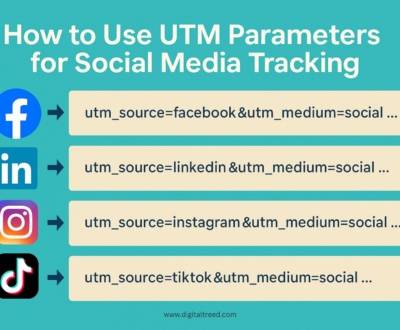How many times did you encounter this? You’re exploring for the RIGHT keywords for the article, checking keyword difficulty, all while viewing other on-page SEO stuff, but… Contenders overrank your website in SERP the other day! Do they understand those magic keywords? They don’t.
So, how do you comprehend that? It’s easy! Just look at the keywords they’ve operated. How to search for the keywords on a webpage? How to discover the proper keyword placement? How to discover whether your competitors operate sorceries or learn the most prominent SEO secret? In this article, we’re going to suggest how to find keywords on a webpage. We hope these strategies will help you to work on your content and outrank your competitors.
How to Find Specific Words On a Webpage: Basics
Let’s say you don’t like to search for a group of related keywords or you already comprehend some keywords, and you’d like to see the keyword density on a particular webpage. How can you accomplish that?
- Press Ctrl+F (Windows) or ⌘ Command+F (Mac)
- Type the word in the search field to discover it on a webpage.
- Review the keyword presence and/or the number of keywords (density) on a page.
The outcomes would look like this:
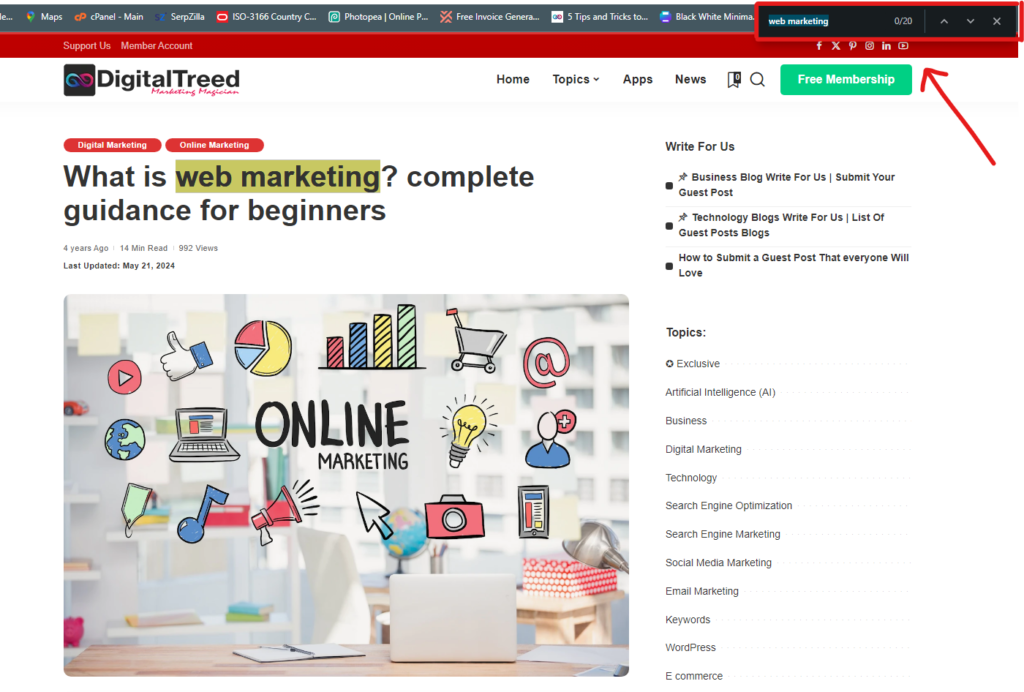
You can direct to this process whenever you like to discover specific words on a webpage. However, if you’re going to discover a group of keywords or a key phrase, you may need to employ some other tools for that.
Website’s Search Bar
According to SEJ, over 40% of users regard the search bar as the most significant feature on the website. This website keyword research tool lets you discover a lot of exciting and various info about competitors.
Usually, it’s found in the upper right corner of the page, and the search itself is clear: you fill in a term and click “Enter”. In this point, the results rely on the panel settings: some are restricted to title scanning, and others are looking for a question in blogs. You’ll have to spend a little time navigating the menus to see the needed phrases.
Another point, is if you’re examining keywords on a website where the search panel takes autocomplete with the desired section preference, e.g., used in Amazon.
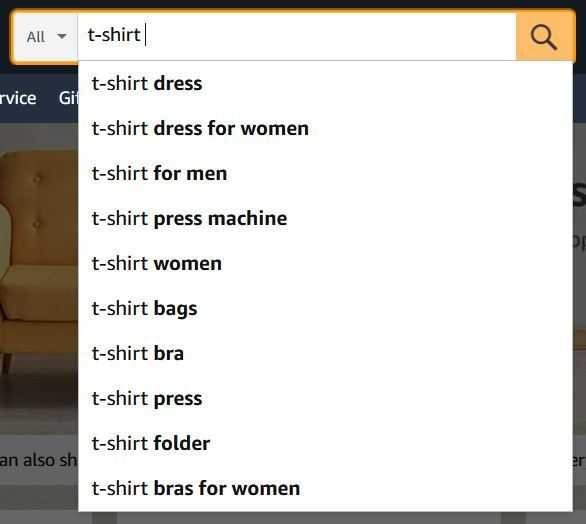
To look up keywords on a website more accurately, use facets. You can set pre-facets before beginning the research when selecting a category. So if we require women’s T-shirts, then it’s clear they can be found in Women’s Fashion.

Post-facets are filters that you use to a certain question, letting you to narrow research to only a few items.
Google “Site:” Search Command
To follow the keywords used on the website pages, use the “Site:” search command. In the Chrome search box, enter site:domain.com “search term”. Please state that there is no space after the colon, but the phrase is enclosed in quotation marks. The last one allows to find exact matches in keywords on a website.
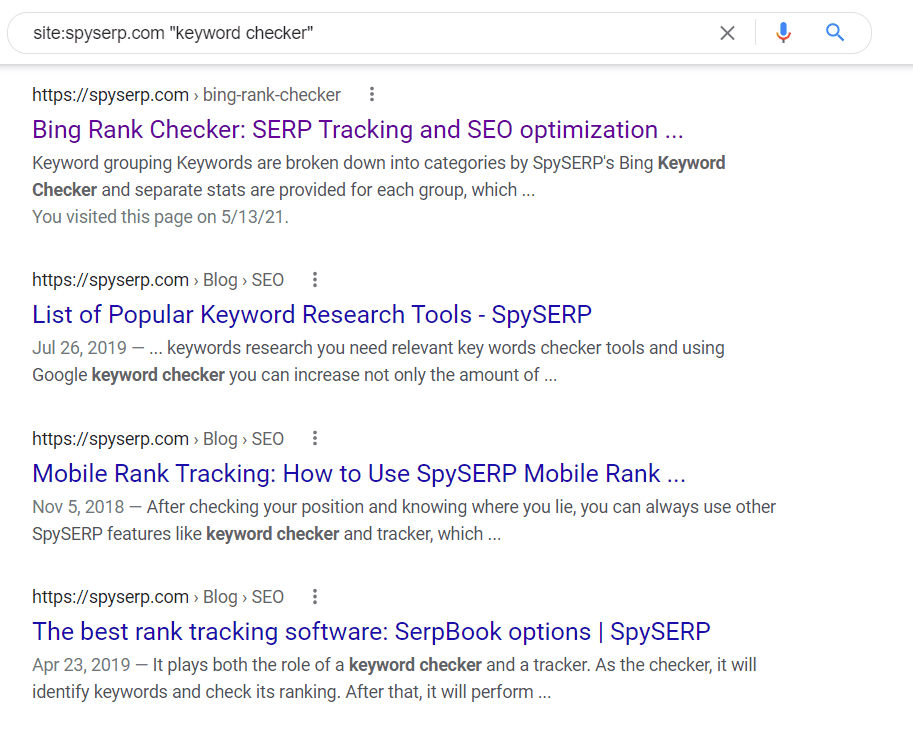
View Page Source
To discover which keywords a website is operating, examine a page’s HTML source. That is a useful tool developed not only for web admins but also for SEOs. In Google Chrome, right-click within the page and choose “View Page Source,” or press Ctrl+U. By searching for tags, you’ll comprehend which keywords your competitors are involving on a definite webpage. To do this, apply the combination Ctrl+F:
- <title> is the title of the page description and is the way Google shows a website in listings. Typically, this proposal contains the main keywords that the page is ranking for.
- <meta name = ”description”> emerges below the title tag in SERP results, but it’s not a ranking agent. However, most websites include competitive phrases that drive conversions.
- <meta name = ”keywords”> is operated to keep track of the keywords that the page is targeting. Although this tag is supposed obsolete, many websites don’t apply it. Thus, roll the dice and try your fate.

7 Ways to search keyword on a webpage
While there are multiple methods you can search for keywords on a website, here are some of the most reliable ways of doing so.
Use the Site:Search command on Google
Google is the most famous search engine in the world. If there is a website on the internet, the probability is that it has been indexed by Google. Therefore, the search engine shows the most complete catalog of websites for every topic.
The site: search command is one of the most utilized techniques by marketers.
The procedure is simple —
- Go to Google search

- Type site: competitor.com “primary keyword” and search.


The results will show you a detailed list of every webpage on the website that has the keyword.
Once you understand that a web page contains similar keywords to yours, the next step is to explore every webpage for various variations of the keyword.
You can either do this by manually seeing every webpage and reading through the text, making notes about different keyword combinations you find, or operating the Ctrl+F search for every webpage.
Use Ctrl+F to search in HTML site
Recognize how we used to see and replace words in Microsoft Word? This process is similar. The CTRL+F hotkeys allow you to scan the text and code of a webpage and find the words you are peeking for.
To find keywords utilizing the Ctrl+F search in HTML, follow these steps:
- Go to a webpage from your competitor’s website.
- Right-click anywhere and choose “View Page Source.”

- Press Ctrl+F to open a search box for the webpage and search for your prior keyword.

The effects will highlight all the occurrences of the word along with the number of times the word appears on the webpage.
This process also helps you determine the keywords that your competitors are utilizing in their meta descriptions, URLs, titles, and headings. Simply adjust the search to meta, URL, title, H1, H2, and H3, respectively.
Note: This process only helps you investigate the keywords present in the HTML code of a web page and not the whole website.
Used in combination with the first process, these two form a solid process for locating keywords on a website.
Use website search bar
Many websites include a search bar in the central navigation menu to enable visitors to smoothly find what they are examining.

If your opponent has such a search bar, you can utilize it to your benefit.
Simply search for the main keyword, and the site will sort its content and display you a list of web pages that have that word or search phrase.

Once you contain a list of web pages with the target keyword, operate the Ctrl+F technique to find keyword variations, URL slug keywords, title tag keywords, and the keywords operated in headings.
Use Screaming Frog to search keyword
Screaming Frog is a free website crawler that allows SEO strategists to analyze websites and discover technical on-page problems with web pages. It is a desktop application that delivers free scans for 500 URLs.
To explore for keywords on a website operating Screaming Frog, do the following:
- Download the desktop application from the Screaming Frog website and install the software.
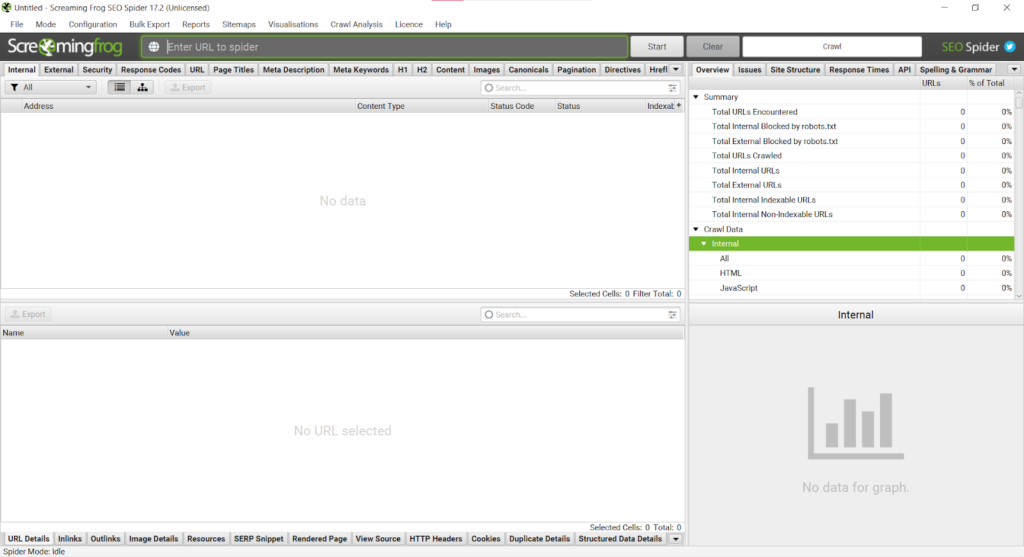
- Enter your competitor’s URL at the top and hit on ‘start.’
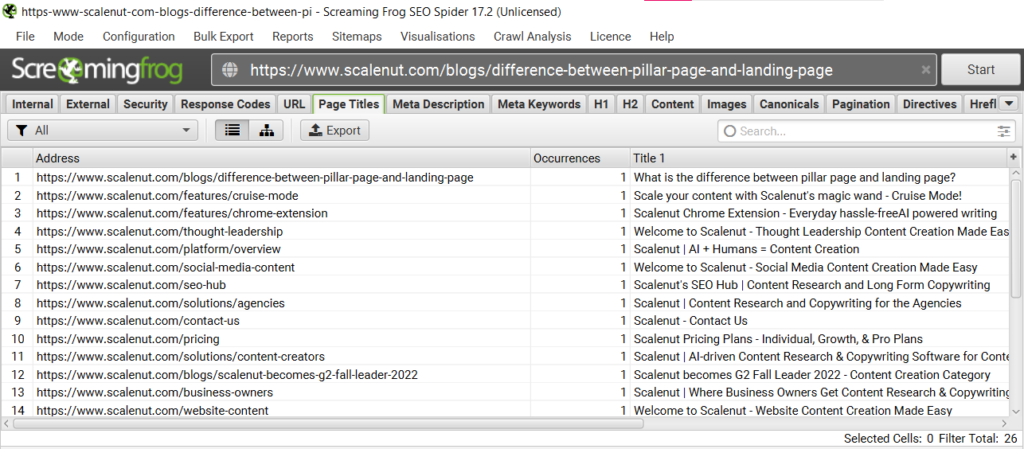
You’ll get a detailed analysis of all the web pages (up to 500) as a result. Screaming Frog shows you detailed knowledge about the page titles, meta descriptions, URL slugs, meta keywords, H1, images, content, and other technical on-page SEO elements.
What you have to do is just go to these tabs and find topic-related terms that they are operating in their titles, H1, H2, meta descriptions, and meta keywords.
Use a keyword planner to search for keywords on the webpage
Another dependable approach to finding the keywords that a website is ranking for is the Google Keyword Planner. This is a business tool that is unrestricted to all businesses with a Google Ads account.
If you don’t have one, you can smoothly sign up within a few minutes.
Once you have formed a Google Ads account, obey these steps:
- Open the Google Keyword Planner
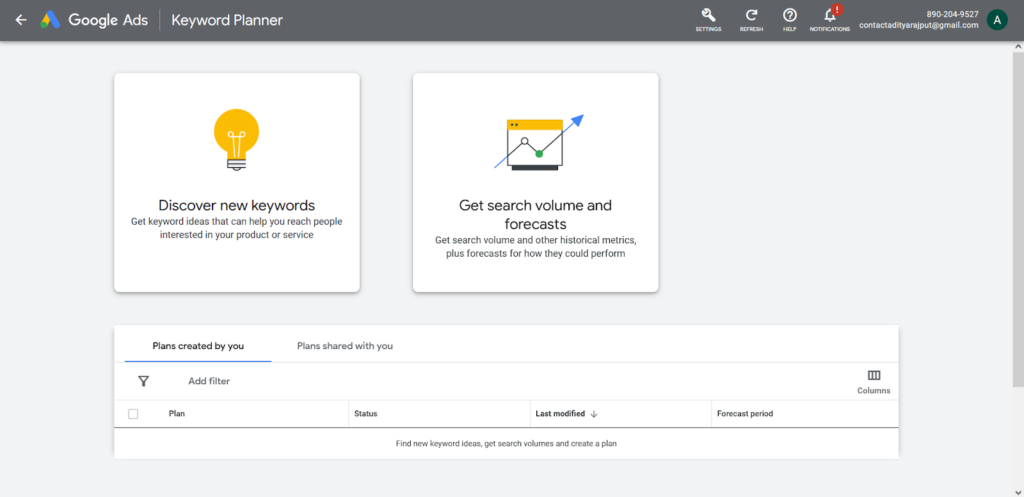
- Choose ‘Discover new keywords’.’
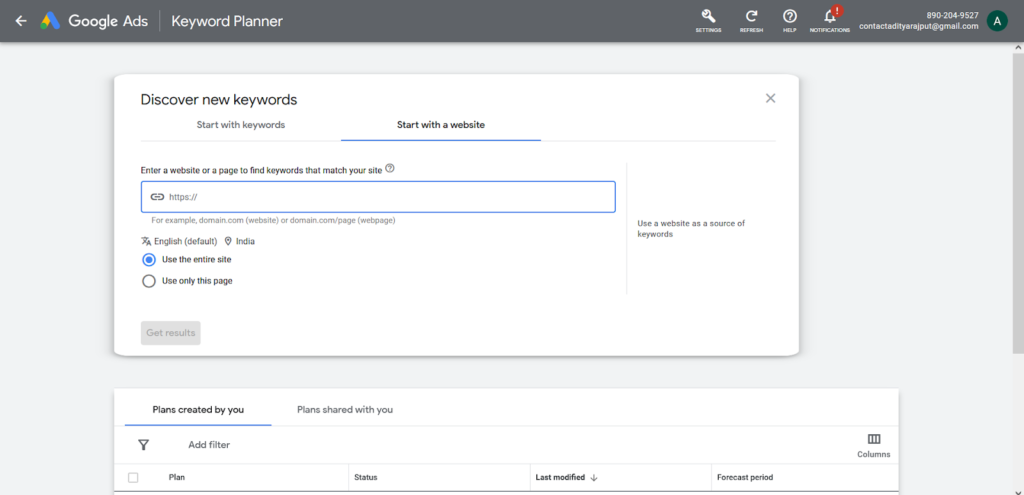
- Choose the ‘Start with a website’ option.
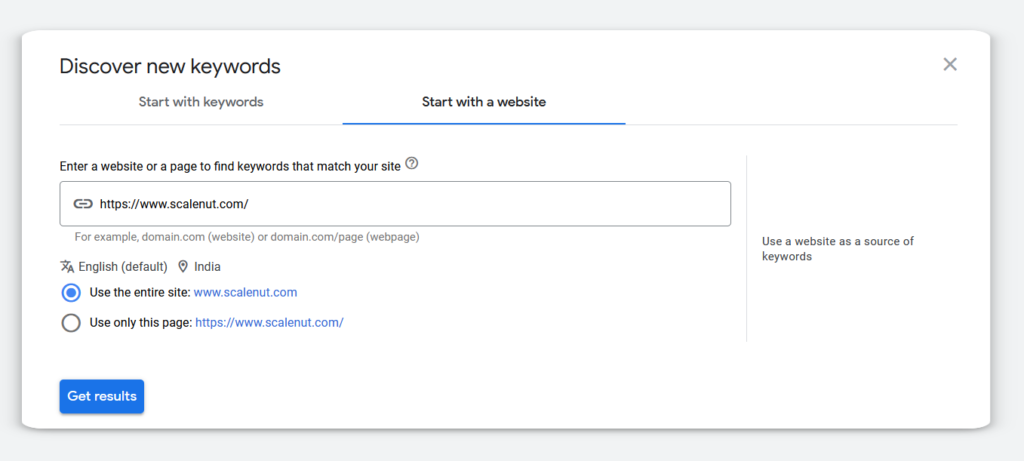
- Copy-paste your competitor’s URL and choose whether you like Google to search the complete site or only the URL. You can also choose a target location.

- Hit on ‘Get Results,’ and Google will produce a complete list of keywords from the website or webpage.
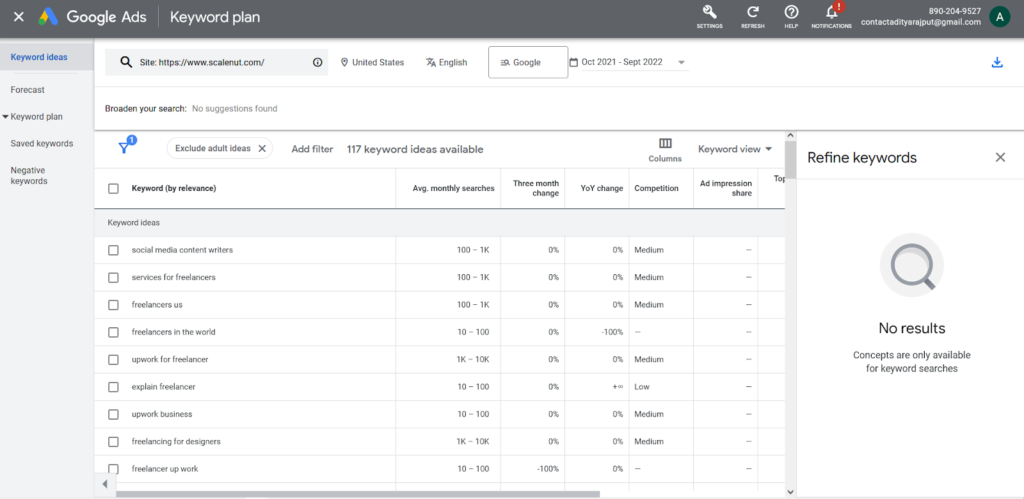
You can download the outcomes as a .csv file or directly export the results as a Google Sheet to your drive.
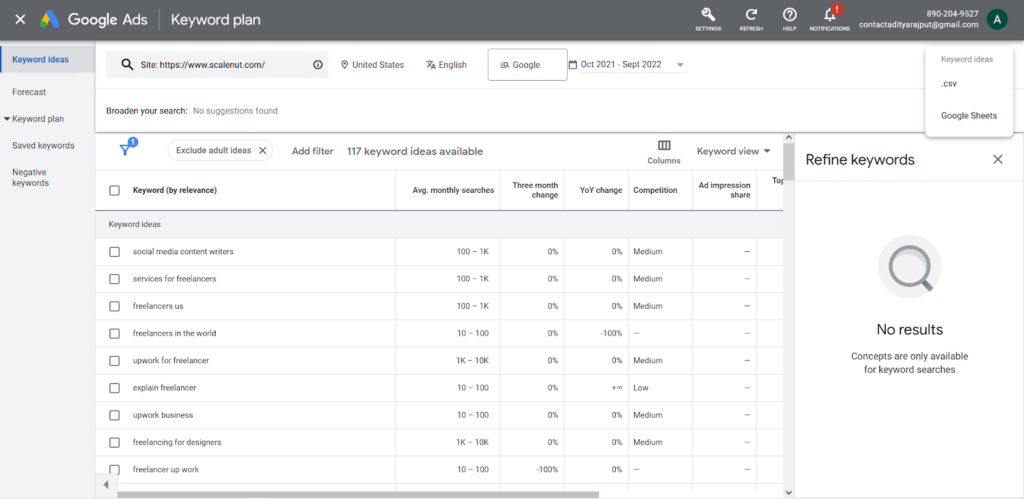
The Google Keywords planner is a fantastic way to find keyword views from your competitors’ websites. The outcomes will provide you additional statistics about search terms, such as average monthly searches and the level of competition.
Use Ahref to search keywords
Ahref is by far the most progressive tool for keyword research. However, users have to pay for a paid program if they like to look at keywords and backlinks on competitor websites.
Once you are on a paid plan, all you have to do is copy and paste the opponent’s URL in the search box at the top and click enter.
Ahref will examine the URL and give a complete description of the backlink profile, organic search statistics, and paid search statistics.
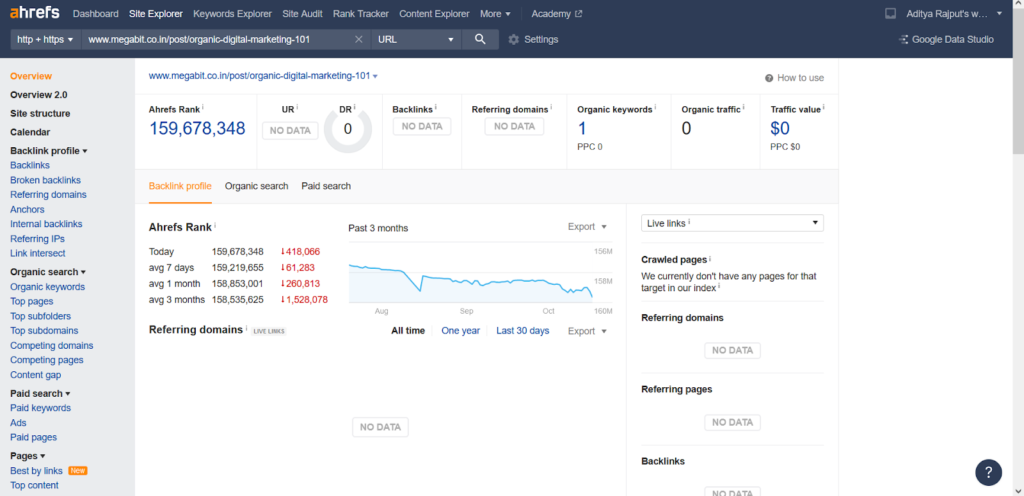
To find the most relevant keywords, head over to the ‘Organic keywords’ tab in the ‘Organic search’ section.
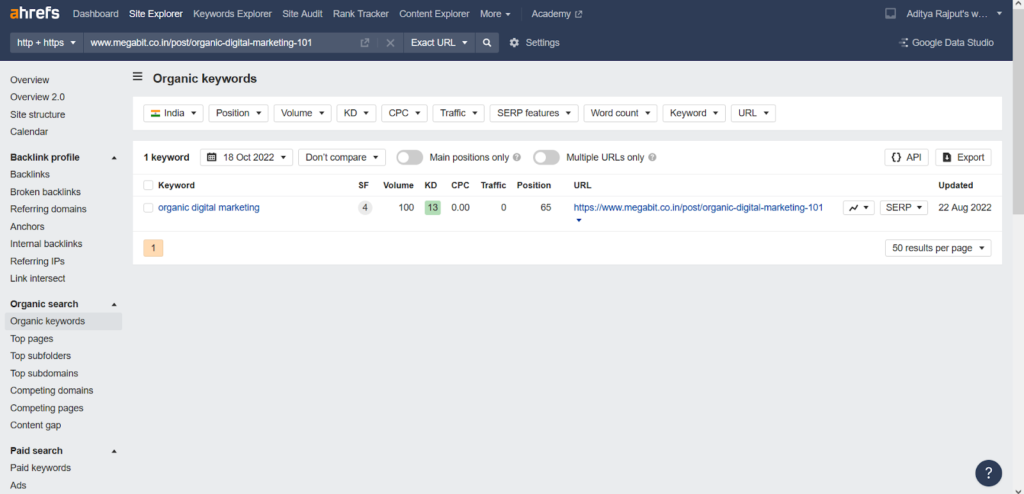
The page will display a list of all the keywords for which the URL is ranking organically.
To determine the paid keywords the website operates in its online ads, just click on the ‘Paid keywords’ tab in the ‘Paid search’ section.
If you aren’t confident about investing in a paid Ahref plan, you can utilize the free version to follow how well your website content is doing.
Use IM Ninja keyword tool
Internet marketing Ninja’s keyword density analysis tool is another helpful way of competitive research. Users can operate the tool to analyze a web page and discover all the keywords on it.
Here is how to utilize this tool:
- Go to the IM Ninja Keyword Density Analysis Tool website.
- Copy-paste your competitor’s web page URL into the search box at the top.

- Hit on ‘Ninja Check’

The tool will do a thorough examination of the URL and divide the keywords into related anchor texts and those that aren’t. It will further categorize those keywords into one-word keywords, two-word phrases (short-tail keywords), and three-word phrases (long-tail keywords).

This is a complimentary tool that you can utilize for any number of URLs. The information from the keyword density analyzer includes the number of links, the total number of words, and unlinked words.
These tools are the most useful method to do competitor website research.
Discovering the right keywords or search terms is tough. There is no straightforward way to look for keyword ideas; it demands time and effort. If you desire to rank on the first page of search results, you must identify specific keywords that your competitors are using.
Most of the tools and techniques mentioned above are free. We hope the above report answers your questions
Conclusion
To succeed in your content marketing campaigns, it is essential to know what keywords are working for your competitors. These details will help you plan useful campaigns and drive better results.
We hope the methods mentioned above help you create the most useful content marketing techniques that outrank the competition and bring your brand to the top of SERPs.
I have been serving web content with my passionate writing skills since 2020. My skills have benefited clients from 20 countries, resulting in 10x audience interactions, improved readability, and SEO-friendly content.

About us and this blog
We are a digital marketing company with a focus on helping our customers achieve great results across several key areas.
Request a free quote
We offer professional SEO services that help websites increase their organic search score drastically in order to compete for the highest rankings even when it comes to highly competitive keywords.


